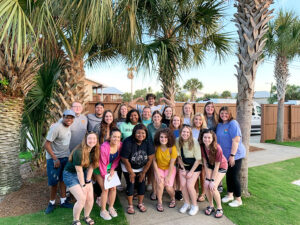The BCM is a ministry of the Tennessee Baptist Mission Board churches. It is a home away from home for so many students that go away for school. It is a great way for smaller churches, far away churches or even churches that don’t have a lot of college students to multiply their impact to reach students.
Baptists have long pooled their resources to have a greater impact for the kingdom than any one church can have on its own. However, there are several of our churches near college and university campuses that have the staff and resources to operate their own activities and outreach to the campus. Here are a few suggestions on how BCMs and campus churches can work together.
BCMs and churches are a blend of one common mission in two different places. We share the common goals of reaching lost students and discipling saved students. We both want to train students to serve and lead.
We want to give them a place to use their spiritual gifts and we also want to provide them with pastoral care. If you know anything about students you know that they move mostly in herds because they like to be together, play together and even learn together. BCMs are usually made up of students from many different churches, but they come together for fellowship, study, mission and ministry.

Students from the BCM at Austin Peay gather for a photo during 2023 Beach Reach — a ministry that sends students to Panama City Beach each year during spring break to share the gospel.
One of the best ways that we can work together is to partner to do evangelism. The best ways for students to be reached is by another student. Students reach students. Instead of taking students away from campus to witness to others why not train students to witness in their environment. Missionaries are always looking for a platform to do their work in closed countries. While a student is in school, they have a platform, and their campus is their mission field. Don’t call them away from their mission field!
Diversity in discipleship is another way that we can work together. BCM’s philosophy is to let students disciple students and teach Bible studies. Often the church model is to have a minister or adults lead that small group discipleship time. We need both. Some students grow more when given responsibility for others, but that can be messy. Other students grow more with structure and clear authority where they are being fed.
People learn in different ways and having many different resources is actually healthy for students to grow in their faith. Many committed students attend multiple small groups in one week because they like the variety and the differences in each group.
Unity in fellowship is another way that we work together. Students like to be together. Students like to date other students. Students often accept challenges and corrections better from peers. Bringing our students together from our separate churches often helps them return to our churches with better ideas and encourages them to be more active. For example, our BCM tried to get our students to organize more prayer time together, but they just couldn’t seem to make the time.
However, when they were with another group that spoke about how often they were gathering in the morning to pray before class, our group was suddenly inspired to do that too. We learn good stuff from solid Christians that are serving God, and spending time together makes learning happen organically.

BCM students and leaders from the University of Memphis were among the 260 students from Tennessee who spent their spring break in Panama City, Fla., as part of the Beach Reach ministry. Nearly 200 professions of faith were recorded this year during the three-week ministry.
Finally let me say just a word about fears when working together. As Baptists we are not in competition, but we all feel pressure to be successful.
Students don’t belong to BCM or to your church; they belong to God. Let’s resource them to grow the kingdom and not worry about competition. The more that we can show them we are on the same team the stronger their witness will be to others on campus.
Bo Griswold, a college minister for First Baptist Church, Hendersonville, said, “Seeing older adults work well together for the same goal of Christ is encouraging and uplifting for younger people who see more disunity in the world than cooperating. So, seeing BCMs and churches work together shows us on a big stage that the gospel is the most important thing.”
Let’s communicate with one another. We sometimes have friction when we overlap calendar events, but even that can be a good lesson in prioritizing and decision making. Where are you a leader? What is your role at any given meeting, retreat, outreach, party, or mission project? Which will have the greater future impact on the kingdom? Be realistic about your needs.
Churches often need volunteers to work with children or youth. BCMs often need musicians and Bible study leaders. We each need to be thinking about which will grow that particular college student more for their future service in the kingdom. If we work together we can multiply our impact for the Kingdom instead of each building our own group. B&R

